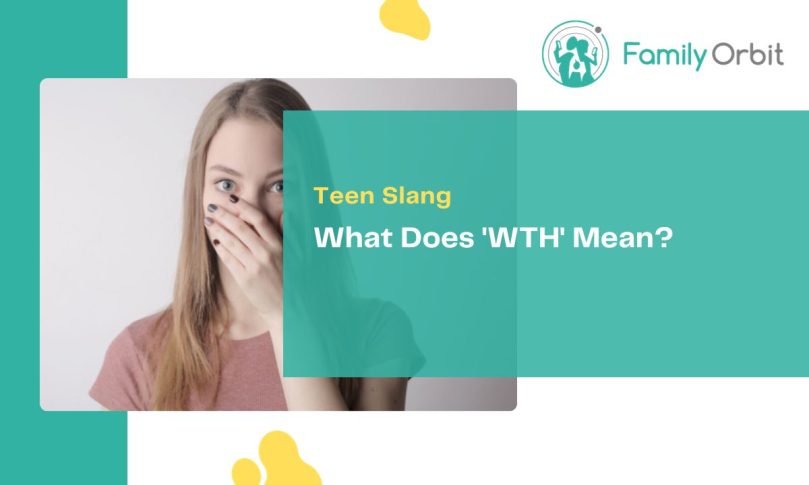You might have seen your kids type WTH during their conversations on TikTok, Snapchat, or even via text. Likely, you’ve been wondering what it means. Here we’ll explain everything you need to know and how teens use it in daily conversations.
We will also determine if it’s slang that you need to watch out for, or if it’s something harmless. By the end, you’ll have a clear idea of how to deal with WTH. Let’s get started!
‘WTH’ Slang Unveiled: The Curious Teen Acronym
WTH stands for “What the Hell” or “What the Heck” which shows surprise, confusion, or anger. Your teens often use slang as a form of expression on its own without adding anything after it. They also use it to say that they don’t mind the consequences of their actions or when they’re explaining something, and you don’t understand it.
WTH is also sometimes used for “Who the Hell?” and “Where the Hell”. When using these, WTH is often a straightforward question that also shows exasperation or frustration.
Where ‘WTH’ Pops Up: Scenarios of Usage
WTH is a polite way for your teens to express themselves without stating strong and vulgar words. Here are the common scenarios where your teens use WTH:
- “Dude, WTH?”
- “WTH did you just tell me?”
- “WTH I never even said that!”
- “WTH?!”
Context Matters: Exploring the Nuances of ‘WTH’
WTH is used the same way one would say “What the hell?” in face-to-face conversations. The expression can be used on its own to say you don’t understand something or you don’t care about the consequences. Also, it can also be used as a question about something while expressing astonishment, confusion, shock, disbelief, and other feelings.
Most of the time, WTH is used for any kind of question. It can be used when asking a genuine question to get an answer from others. Others also use it for rhetorical questions to express a dramatic effect, attempting to share opinions and sentiments with the reader/s of the message or post.
Here are some examples of how WTH is used:
Example 1
Friend 1: “Hey, wanna skip class and just go to the beach?”
Friend 2: “WTH, Let’s do it!!!”
This shows how WTH is used to display a carefree agreement to something. Friend 2 opts to use the expression to show excitement and lack of care about the negative consequences of skipping classes. It can be a verbal equivalent of throwing hands up in the air and having fun despite knowing they will regret the decision later.
Example 2
Friend 1: “My bae n I g2g soon. Let’s ch1ll tmr, mkay?”
Friend 2: “WTH? Can you speak normally, please?”
This specific example shows when WTH is being used to express one’s confusion over something. Friend 2 doesn’t have an idea what Friend 1 is saying, and WTH is used to show how clueless they are.
Example 3
Friend 1: “Michael said he accidentally deleted the file that we need to submit for our project.”
Friend 2: “WTH are we going to do now?”
This example shows how WTH is used to ask for an answer while expressing uncertainty about what to do. Instead of simply asking what they are going to do, Friend 2 emphasizes worries, concerns, and frustration by saying WTH.
Example 4
Friend 1: “There was this man who walked their dog earlier and ignored the huge turd it left on the sidewalk.”
Friend 2: “Eww! WTH is wrong with people!?”
Here, WTH is used rhetorically to react in a dramatic way. Friend 2 expressed distaste and shock upon hearing about the dog walker. This kind of question doesn’t require an answer.
Why Teens Embrace ‘WTH’ in Their Conversations

In today’s fast-paced environment and lifestyle, it’s always easier to use shorthand in messaging. That’s one reason why teens embrace and love using acronyms like WTH in virtual conversations. Plus, it can be used to express different emotions, ranging from joy and surprise to anger and disbelief.
Teens frequently show intense emotions, so instead of using stronger or vulgar language, they use WTH as a milder way to convey feelings. It emphasizes the emotions they’re experiencing, which makes it better than simply using common words. Plus, it helps them control their emotions, which is essential for their development as they grow older.
Parental Perspective: Grasping the ‘WTH’ Slang
WTH is often an interjection included in sentences that express anger, surprise, disgust, excitement, joy, enthusiasm, and a lot more. Surprisingly, this three-letter expression can convey different kinds of emotions.
Aside from expressing feelings, WTH works as a question. Despite being used as an interrogative sentence, it can also be seen without a question mark, especially when used for rhetorical questions.
Fostering Open Dialogues with Your Teen
The key to fostering open dialogues with your teen is keeping a positive relationship with them. If they feel that you cannot be trusted, communicating with them will not be easy. They need to know that you love, care, and accept them unconditionally.
Using open questions is one of the best ways to foster open dialogues with your children. It makes communication easier, unlike closed questions that instantly stop communication once answered.
As parents, you also need to improve your communication skills. Ironically, teenagers need to feel loved and accepted, but they usually make it difficult for parents to give them what they need. However, it’s normal for teens to behave this way and you can do something about this. By changing how you behave and communicate, your teen will match how you approach them.
If you see your children using WTH slang, you might be worried if they are using other similar terms. Another thing you might worry about is whether all the words they use when communicating with other teens are harmless.
A parental control app with monitoring tools will help you with digital parenting in this day and age. With the help of these apps, you can protect your children from dangerous people like bullies, drug dealers, and predators.
Plus, you can choose what is right for your child by limiting their access to sensitive content and setting a schedule for going online. Parental control apps can be a vital tool for parents looking to keep their kids as safe as possible.
- Monitor Calls & Text Messages
- View Photos and Videos
- Location Tracking & Geofence
- Monitor WhatsApp & Kik
- Detect & Alert for Inappropriate Activities
- Monitor Websites Visited
- Compatible with Android and iOS
- What Does OC Mean: A Teen Slang Demystified
- SUS Meaning: The Stealthy Teen Slang That’s Keeping Parents Guessing!
- 200+ Teen Slang Terms Decoded for Parents: Unlocking the Teen Lexicon
- Unlocking the ‘Cap’ Slang Mystery: What Every Parent Should Know!
- Dope Slang: Understanding the Modern Teen Language
- Boujee Meaning Unveiled: Navigating the World of Bougie Slang
- ISTG Meaning in Text: Decoding the Acronym in Online Conversations

